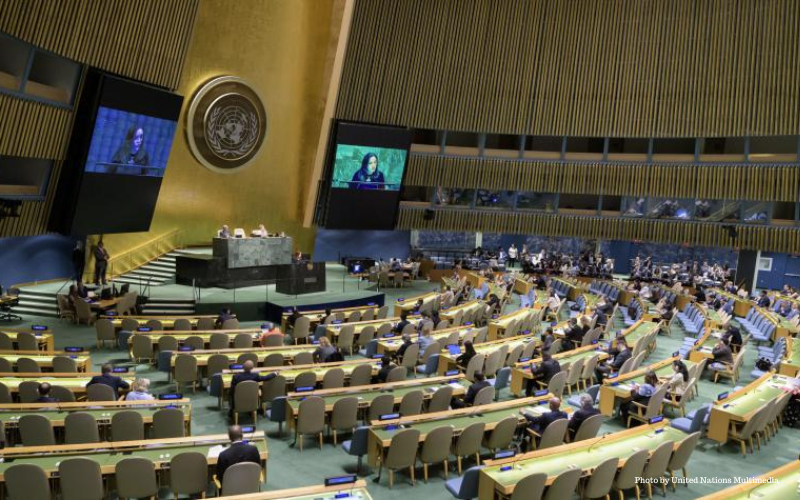September 2023 is forecast to be heavy in summiteering, as already two summits and a ministerial meeting are scheduled to take place in the space of a few days, around the high-level “UN Week”, namely: an SDG Summit, another Climate Summit, and a Ministerial Meeting in preparation of the September 2024 Summit of the Future. In the usual UN fashion, the outcomes of these high-level events need to be prepared in advance through intergovernmental consultations, to ensure there is something ready for leaders to sign when they come together in New York.
Can we expect that something more than nice, diplomatically balanced words will come out of each and all of these events? There are good reasons why they are convened in the first place:
- With seven years to go till the supposed achievement of the SDGs, a mid-term review through the SDG Summit makes good sense for course correction and recommitment of both political will and resources. Can we expect anything major on the latter, though, with rich country resources being redirected, as they are, from (domestic) COVID response to the war in Ukraine and broader economic and geopolitical competition?
- Eight years after the adoption of the Paris Agreement, the world will take stock of progress towards its achievement at UNFCCC COP28 in Dubai in November-December 2023. In that light, it makes good sense to use the new Climate Summit a couple of months earlier to renew pressure on countries and their leaders to actually deliver on the Paris Agreement. Will the necessary funding, technology transfer, and capacity building be delivered, though, and who is really verifying the implementation of state and non-state actor commitments and declarations?
- The Ministerial Meeting for the Summit of the Future is a preparatory step toward the actual Summit scheduled for September 2024. The Meeting’s outcome can set the tone for the Summit itself. With inputs from the UNSG’s High-level Advisory Board on Effective Multilateralism and non-state actors, in addition to UN member state input, will the level of ambition be set high enough for meaningful renewal of the UN and global governance, or will it be an opportunity lost with unforeseen consequences?
More summit-level events may be planned for the coming busy September at UN Headquarters. It is already clear, though, from the above three major events, that this may turn out to be “Judgement Day”: an opportunity for multilateralism to show that it can deliver substantively for people and the planet, or a proof that the doomsayers are right in claiming that multilateralism is ineffective and becoming obsolete. We certainly hope the former will carry the day, but for that to happen there are certain conditions that have to be met, not least:
- An acknowledgment of the interconnections among the three high-level events, a common narrative, and a shared vision for the future that is clear, compelling, and practical.
- New mechanisms for sharing funding, technology, and know-how, with adequate monitoring and verification arrangements, to rebuild the trust between the Global South and the Global North, and to get substantive results that improve a lot of the poorer segments of humanity. Relying on ODA that never reaches the modest and insufficient 0.7 target and on charitable donations can no longer be defended. Structural changes are needed in the way the International Financial Institutions and the global financial system work, the targeted issuance of non-restrictive SDRs, as well as multilateral system funding through direct taxation of international transactions and other such arrangements that benefit from a functioning global governance system.
- A coordinated mobilization of the whole UN system and other intergovernmental bodies to tackle effectively today’s existential risks for humanity. These risks have drivers and causes that do not fall neatly under any one intergovernmental body. Similarly, their consequences go well beyond the scope of any single body, even if they are assigned to one (e.g. climate change to UNFCCC, pandemics to WHO). Given the multiple dimensions and complex interconnections such risks exhibit, it is time to adopt a systems’ approach and set up a body with authority, analytical capacity, and operational prowess similar to those the UN Security Council has for addressing traditional threats to peace and security; this time for human security threats, without the veto right for anybody, and systematically engaging non-state actor constituencies.
The UN General Assembly consultations for the Ministerial Meeting and the Summit of the Future that is about to begin offering a good platform to start talking about all this in earnest.
The authors of this article, former UN staff members Dr. Harris Gleckman and Dr. Georgios Kostakos, proudly acknowledge that they are members of the Executive Board of the Foundation for Global Governance and Sustainability (FOGGS), which promotes the establishment of a Global Resilience Council (GRC) as a “UN Security Council for non-military threats” and is actively engaged in the Coalition for the UN We Need (C4UN) of civil society organizations and think tanks from around the world.




